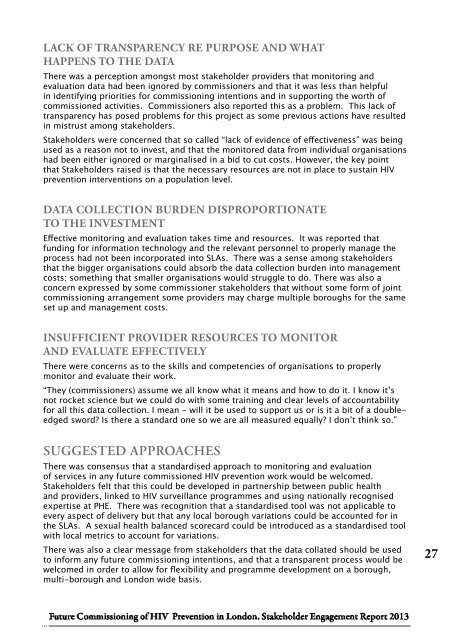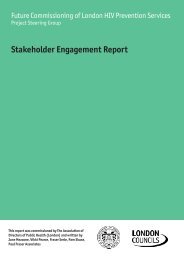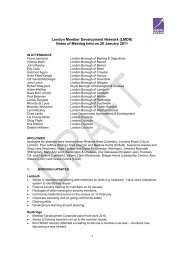Stakeholder Engagement Report - London Councils
Stakeholder Engagement Report - London Councils
Stakeholder Engagement Report - London Councils
You also want an ePaper? Increase the reach of your titles
YUMPU automatically turns print PDFs into web optimized ePapers that Google loves.
Lack of transparency re purpose and what<br />
happens to the data<br />
There was a perception amongst most stakeholder providers that monitoring and<br />
evaluation data had been ignored by commissioners and that it was less than helpful<br />
in identifying priorities for commissioning intentions and in supporting the worth of<br />
commissioned activities. Commissioners also reported this as a problem. This lack of<br />
transparency has posed problems for this project as some previous actions have resulted<br />
in mistrust among stakeholders.<br />
<strong>Stakeholder</strong>s were concerned that so called “lack of evidence of effectiveness” was being<br />
used as a reason not to invest, and that the monitored data from individual organisations<br />
had been either ignored or marginalised in a bid to cut costs. However, the key point<br />
that <strong>Stakeholder</strong>s raised is that the necessary resources are not in place to sustain HIV<br />
prevention interventions on a population level.<br />
Data collection burden disproportionate<br />
to the investment<br />
Effective monitoring and evaluation takes time and resources. It was reported that<br />
funding for information technology and the relevant personnel to properly manage the<br />
process had not been incorporated into SLAs. There was a sense among stakeholders<br />
that the bigger organisations could absorb the data collection burden into management<br />
costs; something that smaller organisations would struggle to do. There was also a<br />
concern expressed by some commissioner stakeholders that without some form of joint<br />
commissioning arrangement some providers may charge multiple boroughs for the same<br />
set up and management costs.<br />
Insufficient provider resources to monitor<br />
and evaluate effectively<br />
There were concerns as to the skills and competencies of organisations to properly<br />
monitor and evaluate their work.<br />
“They (commissioners) assume we all know what it means and how to do it. I know it’s<br />
not rocket science but we could do with some training and clear levels of accountability<br />
for all this data collection. I mean - will it be used to support us or is it a bit of a doubleedged<br />
sword? Is there a standard one so we are all measured equally? I don’t think so.”<br />
Suggested approaches<br />
There was consensus that a standardised approach to monitoring and evaluation<br />
of services in any future commissioned HIV prevention work would be welcomed.<br />
<strong>Stakeholder</strong>s felt that this could be developed in partnership between public health<br />
and providers, linked to HIV surveillance programmes and using nationally recognised<br />
expertise at PHE. There was recognition that a standardised tool was not applicable to<br />
every aspect of delivery but that any local borough variations could be accounted for in<br />
the SLAs. A sexual health balanced scorecard could be introduced as a standardised tool<br />
with local metrics to account for variations.<br />
There was also a clear message from stakeholders that the data collated should be used<br />
to inform any future commissioning intentions, and that a transparent process would be<br />
welcomed in order to allow for flexibility and programme development on a borough,<br />
multi-borough and <strong>London</strong> wide basis.<br />
27




